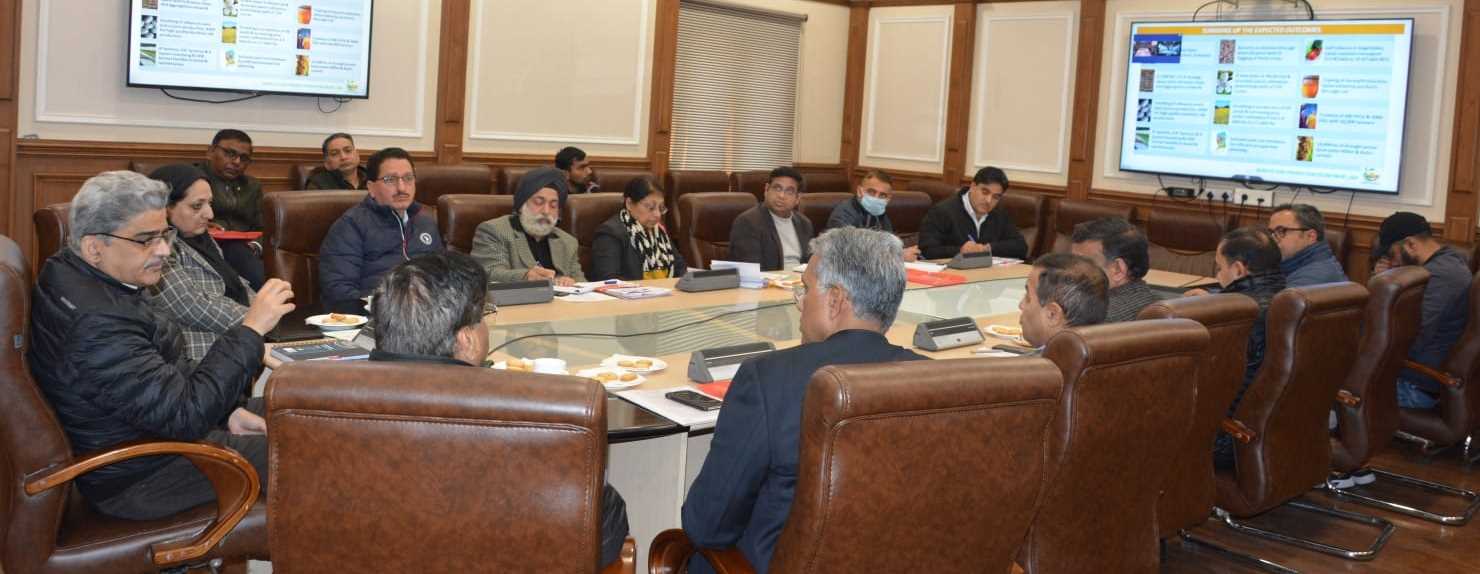Additional Chief Secretary (ACS), Agriculture Production Department, Atal Dulloo, chaired a meeting to review Skill Development in Agriculture and its allied sectors here today at Civil Secretariat.
The meeting discussed the recommendations of the Dr Mangla Rai Apex Committee Report, which aims to provide skill improvement and entrepreneurship-related training to 2.5 lakh farmers engaged in agriculture and allied sectors in J&K. The training aimed at increasing their income and overall economy of Jammu & Kashmir.
During the meeting, a presentation on the Holistic Agriculture Development Programme was given, which outlined the proposed courses for farmers. A total of 29 skill training programs were proposed, including 21 in Agriculture and Horticulture, 3 in Agricultural Engineering, 4 in Forestry, 3 in Sericulture, 6 in Veterinary & Animal Sciences, 2 in Fisheries and 1 in Rural Business Management.
It was highlighted that there is a need for skilling and upskilling in the following emerging agriculture sectors: Farm Mechanization and Micro Irrigation, Protected cultivation such as Hydroponics, Greenhouse, Milk and Meat processing, Digital Agriculture, Weather forecasting, Agriculture warehousing and cold chain logistics, Alternate energy such as SOLAR and BIOMASS, and Commodity supply chain management. These sectors are seen as key areas for growth and development in the agriculture industry and training in these areas will help farmers and professionals stay current and competitive in the market.
Atal Dulloo stated that the main focus of the administration is to increase seed production.
He also highlighted the potential for fast-growing sectors such as trout production and mushroom cultivation to increase farmers’ income.
The ACS emphasised the importance of providing training on food processing, value addition and market linkage as well as fostering a culture of self-employment and entrepreneurship in Jammu & Kashmir.
He suggested that participants be provided with certificates upon completion of the training courses, and also suggested that entrepreneurship development programmes should be included in the course curriculum.
He said that sensitisation of the departmental staff is being done and will be completed by April this year.
He directed that the curriculum design be finalised in a month, resource persons for which be identified and trained by March, and a training calendar for 2023-24 be released subsequently.
He also emphasised the importance of making use of existing training centres in various departments.
He asked the concerned that training-related videos be made so that more farmers can be educated in the easiest manner.
The videos should be made by February ending and be posted on a dedicated YouTube channel. One committee for each course will be formed with constituent members from IIM, SKUAST and respective departments.
The Skill Development programs are planned to begin with an Orientation stage, where line departments, under the supervision of technical working groups/KVKs of SKUAST-J/K, will provide training.
The content will be in local vernacular languages only to ensure that the farmers can understand and benefit from the training.
In the Skilling stage, the content will be co-developed by SKUAST, Line departments and guidance can be sought from IIM-Jammu, NSDC and ASCI. The content will be in the form of e-Content and will make use of Learning Management Systems (LMS) with a focus on AV medium.
In the last stage, Enterprise Incubation will involve handholding in setting up enterprise and marketing linkages for a self-sustaining enterprise. IIM-Jammu will help in developing a self-sustaining business enterprise/model, providing guidance and support for farmers to establish and grow their own businesses.

